Jeanette witnessed her three children being killed
"I pray to God that I never dream of them"
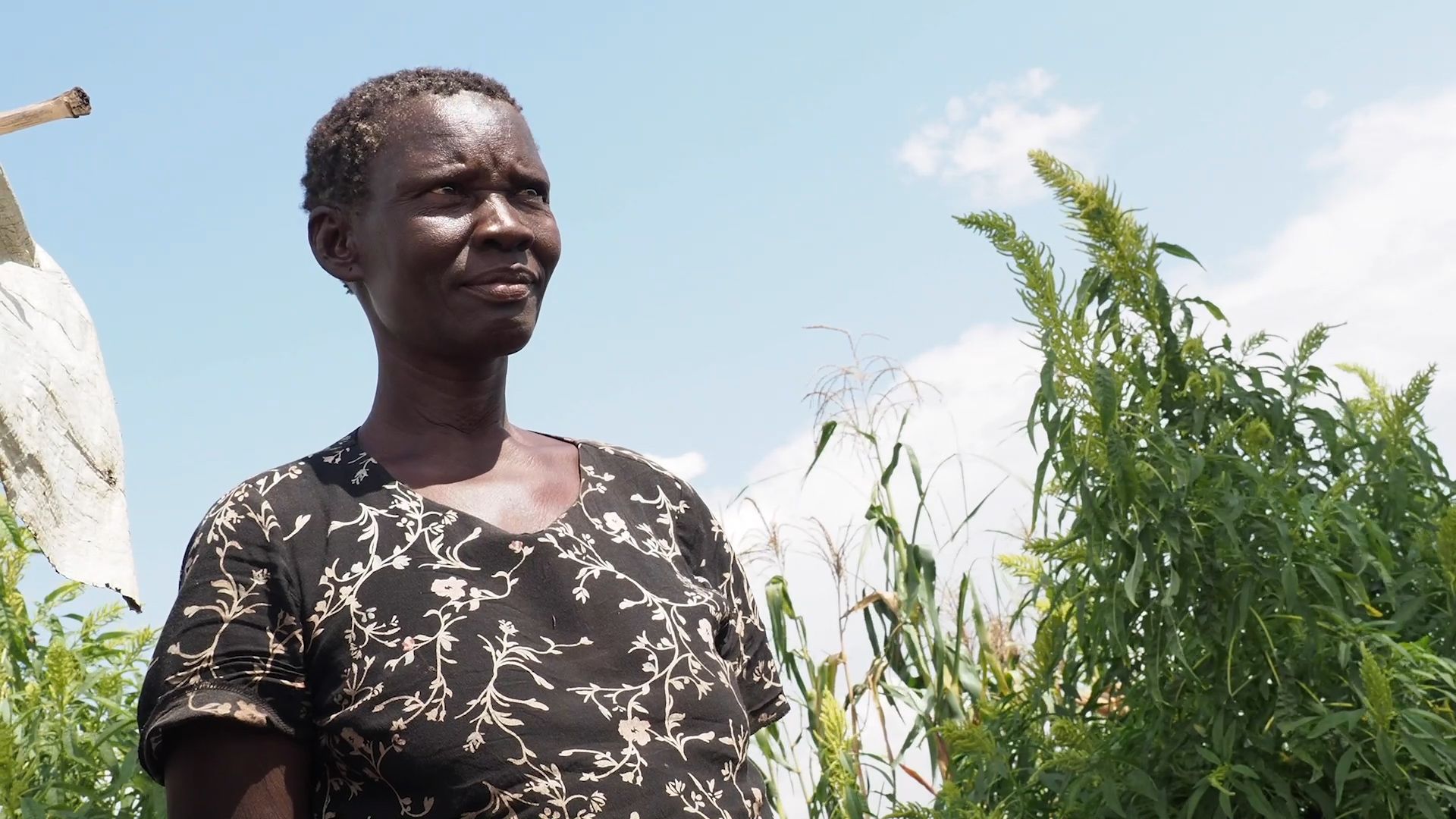
One night, Jeanette's small village in the Democratic Republic of the Congo (DR Congo) is attacked by men with guns and machetes. Jeanette grabs her young son and they run for their lives down to the shores of Lake Albert. They find space in a fishing boat crowded with people fleeing, all on their way to safety in Uganda. But where is the rest of Jeanette's family - the three children and her husband? Terrified, she scans the shore and sees them.
All four of them are being hacked to death.
Uganda provides protection to people fleeing violence
Nearly 20 years has passed since that indescribably painful night in 2000.
Jeanette, 61, is sitting on a stool in front of her small house in Kyangwali, Uganda. She is wearing a floral dress. She doesn’t own any shoes. Her hands are marked by a life of toil and work. She folds them in her lap as she speaks:
“Ayen’ya was 11 years old, Ageno was eight and Munguhik was six. In my dreams, I can see all those who have died. But never my children. When I lost them, I prayed to God that I would never dream of them. Because I knew that if I did, I wouldn’t be able to continue living,” she says.
Whilst living in Uganda as a refugee, Jeanette decided to return to her life in DR Congo with her son despite her fears because she still had a house and land there. Later, her son, a divorced father of two, disappeared. Jeanette was left with the responsibility of her two grandchildren.
In 2016, the village was attacked once more by armed men. It happened at night. Some women of the neighbourhood were tied up and raped. Some tried to hide in the forest.
"But they came back naked," says Jeanette.
With a calm voice, she tells of people who were shot. Beheaded, chopped to death. She saw the bodies. Once again, she ran for her life. She escaped with her two grandchildren and fled to Uganda.
Once more she looks down at her hands and says:
“Life as a refugee is tough. We lack food and I am in poor health. But at least we are safe here. Here in Uganda, the Norwegian Refugee Council are helping my grandchildren go to school. I am grateful for that. Now I know they're going to have a good future. I'm never going back to my home village. Never again will I witness the evil that is there.”
West of Kampala
The morning sun rises through the car window. The Kikuube district is in western Uganda. The landscape is green and lush.
The car passes traditional thatched-roof huts and people working, bent over, in the fields. We turn off from the main road, make a left and find ourselves on a bumpy dirt road. We see children in school uniforms, walking determinedly towards the future, and women balancing yellow water jugs on their heads while carrying infants on their backs.
In a village, an indifferent white hen meanders down the middle of the road. There are two men sitting on a bench playing cards. A boy stands watching insects as they dance across a puddle.
Finally, we arrive at Kyangwali Refugee Settlement.
Kyangwali
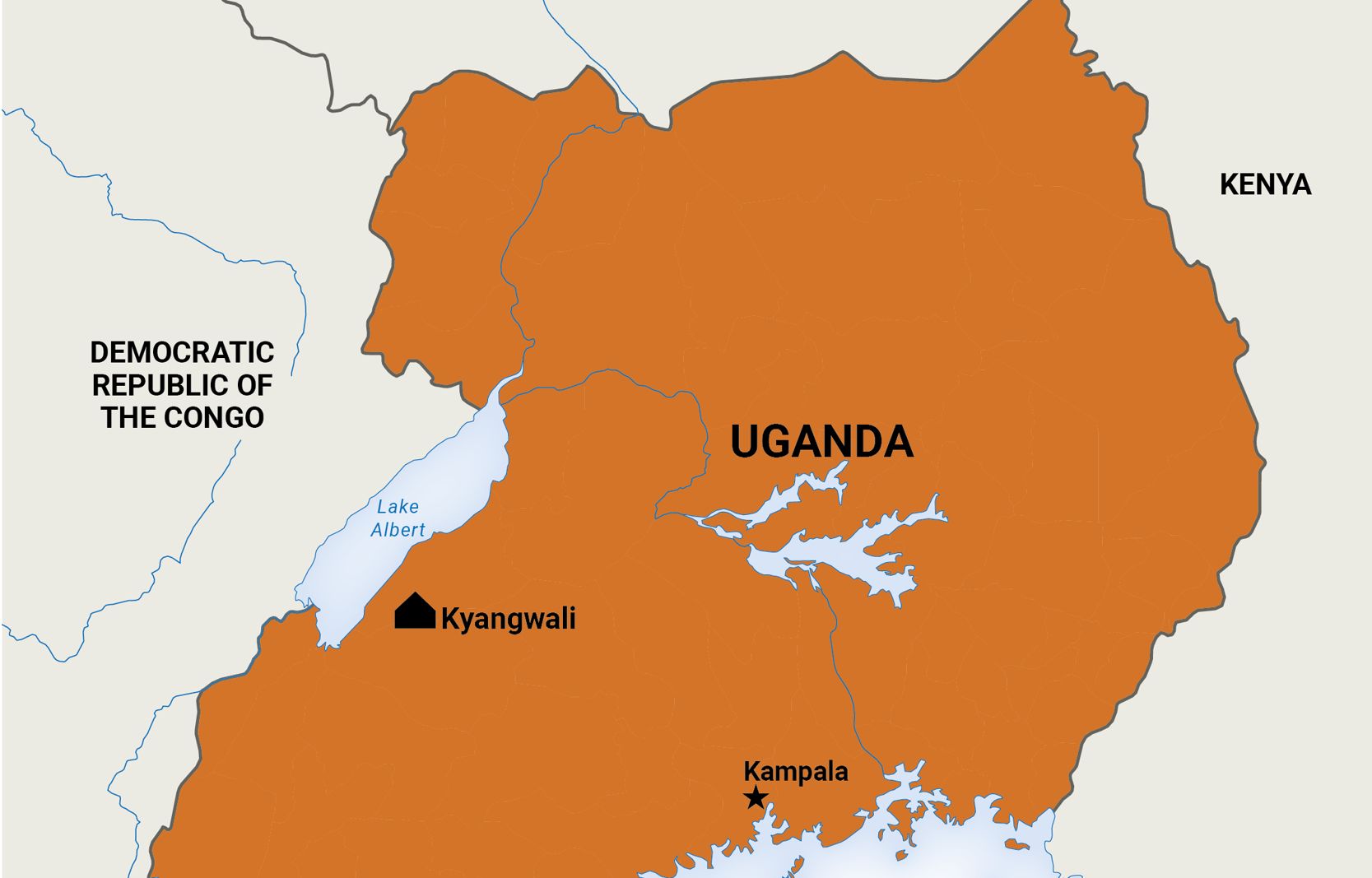
The settlement was established in the 1960s and has since welcomed refugees from Rwanda, Burundi, Sudan, South Sudan and DR Congo. Some have lived in the area for many years and want to stay. Today, there are around 118,040 refugees living in Kyangwali, and 57 per cent of them are women and girls.
Refugees welcome
The refugees here don’t live in tents, but in houses and huts. They have gardens and land for growing food.
| Uganda |
| Uganda is the world's third largest refugee hosting country. Only Turkey and Pakistan has more. The country has unique laws and regulations that promote the safety of refugees and gives them a better life. The Refugee Act of 2006 states that refugees have the right to freedom of movement and work, the right to establish businesses and the right to access public services such as healthcare and education |
Today, Uganda houses 1.4 million refugees and asylum seekers. The humanitarian needs are great and relief work suffers from being heavily underfunded. The Norwegian Refugee Council (NRC) and other humanitarian aid organisations are doing as much as they possibly can to assist refugees. But with more financial support, so many more could be helped.
Dreams
Before the war Jeanette had a stable life in DR Congo. She had a small patch of land where she grew vegetables that she sold in the market.
“Here in Uganda it’s harder to manage. But I have this house and a small patch of land where I grow vegetables. I usually make the rounds and ask to get small jobs. But my health is failing. I have heart problems, as well as a terrible cough.
“Life has been difficult. I’ve lost nearly my entire family. I only have two grandchildren. I have fought hard to support them.
“When I have no work, I sit at home. I prepare food for the children. We eat twice a day. Either beans, corn or rice.
“In DR Congo, there is war and suffering. The children don’t want to go back there either. In Uganda, they can go to school. They plan to get an education and to stay here. My dream is for that to become a reality.”
She smiles a little.
Her 13-year-old grandson is standing behind her. His name is Dongijo.
“What’s good about living in Uganda?” I ask.
“The school”.
“What is not good here?”
“There is not enough food.”
| Kyangwali |
| The refugees are spread across six zones. The zones consist of 20 “main villages” and 359 smaller settlements, with each settlement containing 100 households. The camp has two reception centres. Currently, there are between 150 and 300 refugees arriving daily. NRC assists the refugees in Kyangwali with emergency aid such as food, shelter, clean water and latrines to prevent cholera. We are also strongly committed to providing long-term assistance, such as education and training. Our legal aid workers help people obtain vital documents such as identification papers. We also provide information and assistance regarding refugees’ rights, such as housing and land rights. |
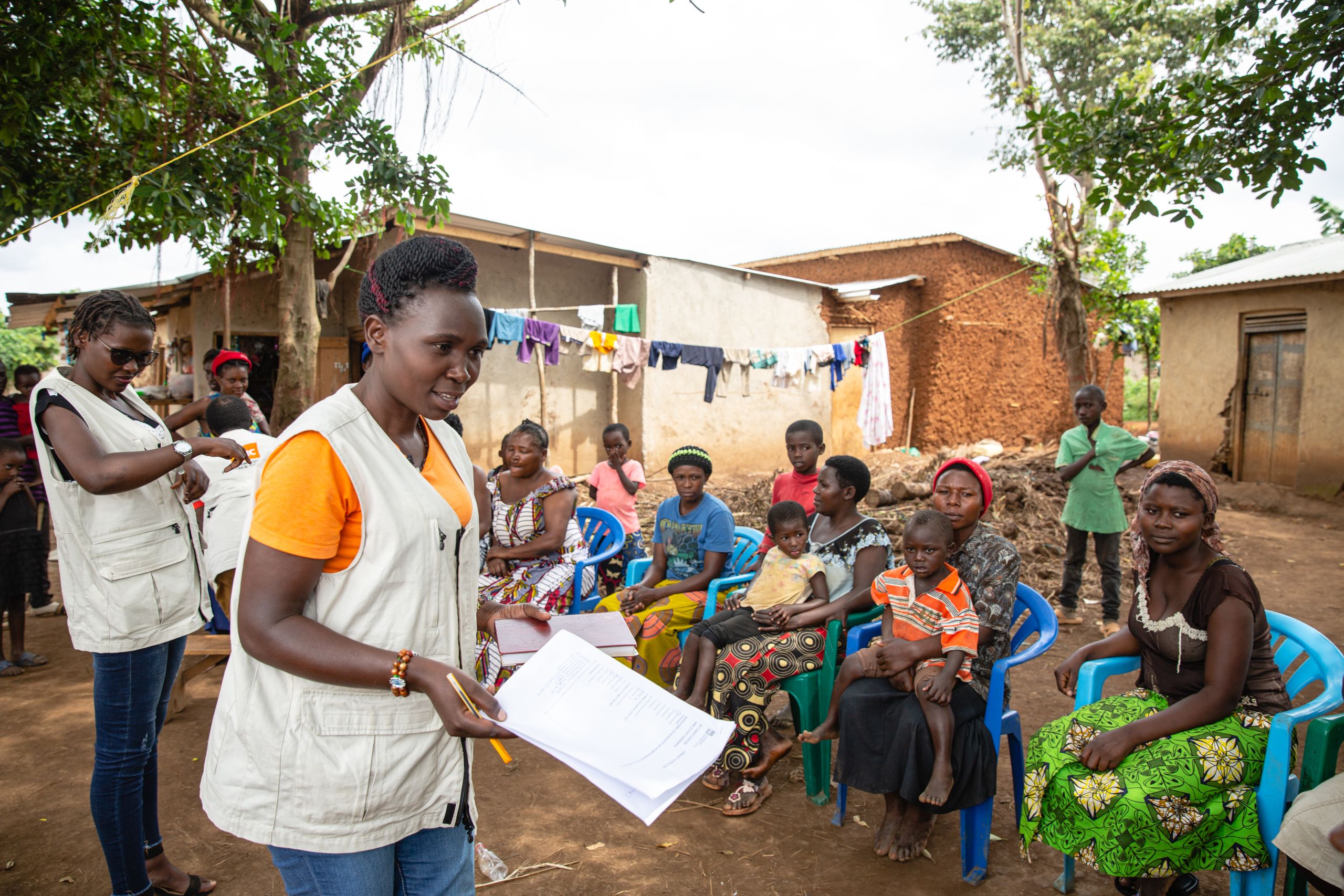
NRC staff help newly arrived refugees with information about their rights. We provide both emergency and long-term assistance to refugees.
NRC staff help newly arrived refugees with information about their rights. We provide both emergency and long-term assistance to refugees.
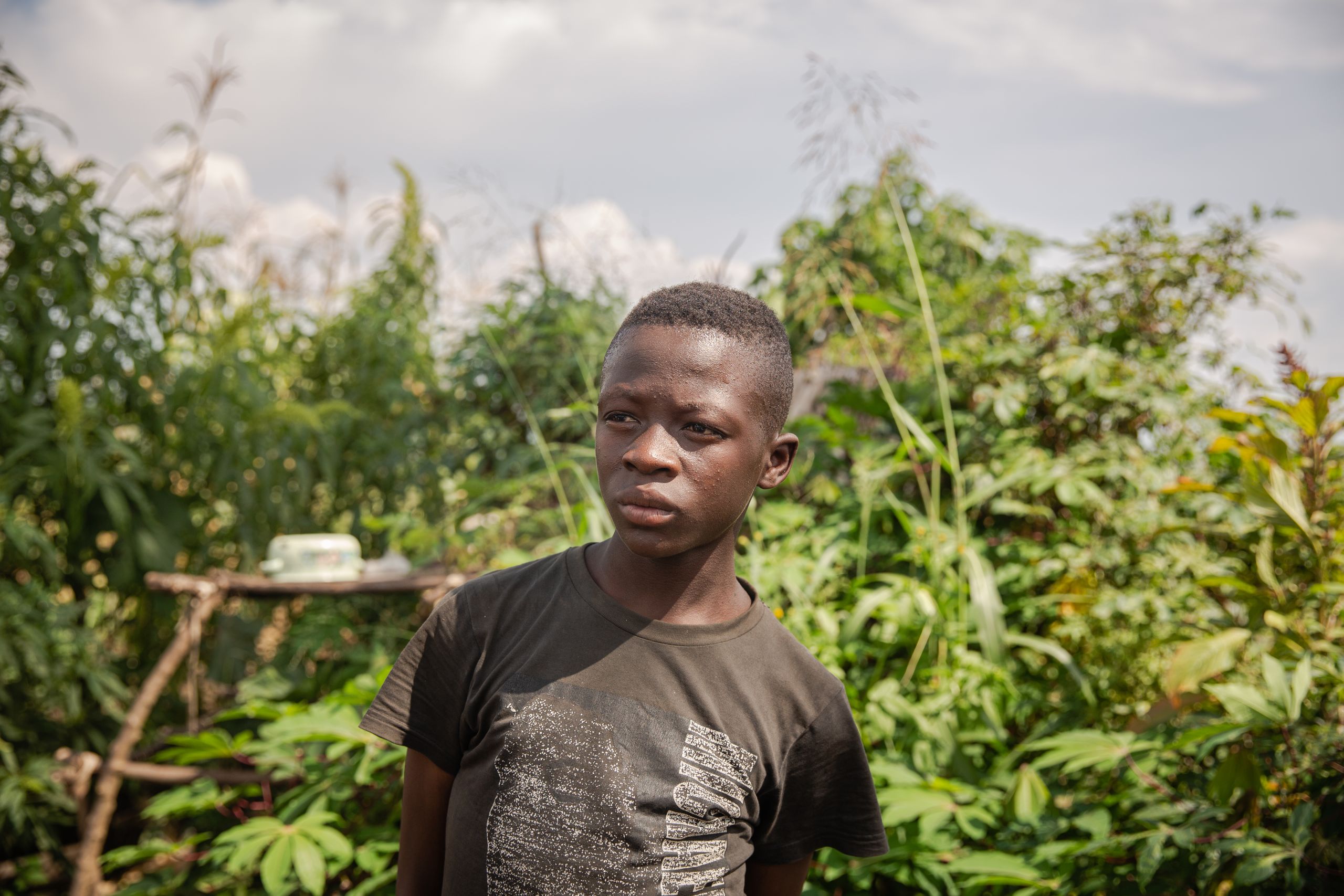
Dongijo lives with his grandmother Jeanette in the refugee camp. He finds it difficult that there is almost never enough food for him to eat properly. But one thing is very good: here in Uganda he gets to go to school.
Dongijo lives with his grandmother Jeanette in the refugee camp. He finds it difficult that there is almost never enough food for him to eat properly. But one thing is very good: here in Uganda he gets to go to school.
Lake Albert
On 31 January 2020, there were 402,521 refugees from DR Congo in Uganda, according to the UN Refugee Agency (UNHCR).
Many of them had fled across Lake Albert, which lies between DR Congo and Uganda. This happens every time there are new violent attacks in DR Congo.
Heavily pregnant Mariam, 22, is among the many Congolese who have fled their homes because of conflict and violence affecting the communities. She came to Kyangwali in February 2018. She recalls those dramatic days:
“When we were attacked, we had no time to bring anything with us. We fled through the forest, towards Lake Albert. There were lots of people. Everyone was panicking. Young and old, children, women and men. When we arrived at the boat, one of my cousins told me that several women, including another of my cousins, had been raped by unknown men. But it was too dangerous go back and look for her. I still don't know if she’s alive.
“Everyone wanted a place in the boat. It was only about ten metres long. People pushed their way on board. There were about 80 of us in the boat. I was certain we were going to drown. It took two and a half hours to cross the lake. Fortunately, we arrived alive.”
Fainting when she heard gunshots
Her hair is swept back from her serious face and tied in a small knot in the back. Mariam says that she is the youngest of eight siblings. One day, almost all of her family’s cows were stolen, their entire livelihood effectively taken away.
“My father, who was also a pastor, struggled to provide for us. The church paid for a year of schooling. Then, my father sold the few animals we had left so that we could finish school. In 2016, I started working as a teacher. I was happy to be able to support my family.
“In February 2018, we heard about riots taking place in an area six kilometres away. We were advised to get away to safety. But I hadn’t received my January salary yet, so I waited. On 7 February, while I was teaching in the classroom, we heard gunshots. I was so scared that I fainted. Some women gave me sugar water to bring me around. My parents called my siblings and said that we had to flee to Uganda – immediately.
Fears for the future
“I met my husband here in Kyangwali. He’s also from DR Congo. His name is Makibapo and he’s 28 years old. He has an injured leg and is currently not working.
“With all that said: we’re doing well in Uganda. We are happy with the help we receive.”
NRC is helping her to obtain up-to-date identification papers. She wants to be registered as her husband’s spouse. We are also helping her with legal assistance regarding land rights, as the land the couple are living on now is not legally theirs. They also need help to fix the leaking roof.
“After my husband fell ill and had to go to hospital, we returned home and found that what little we owned had been stolen. We hope to get real jobs. Right now, I’m only working part-time, facilitating activities at a school. I earn almost nothing.
Mariam looks down on her swollen belly and says:
“I’m looking forward to becoming a mother. But I’m worried about the future.”
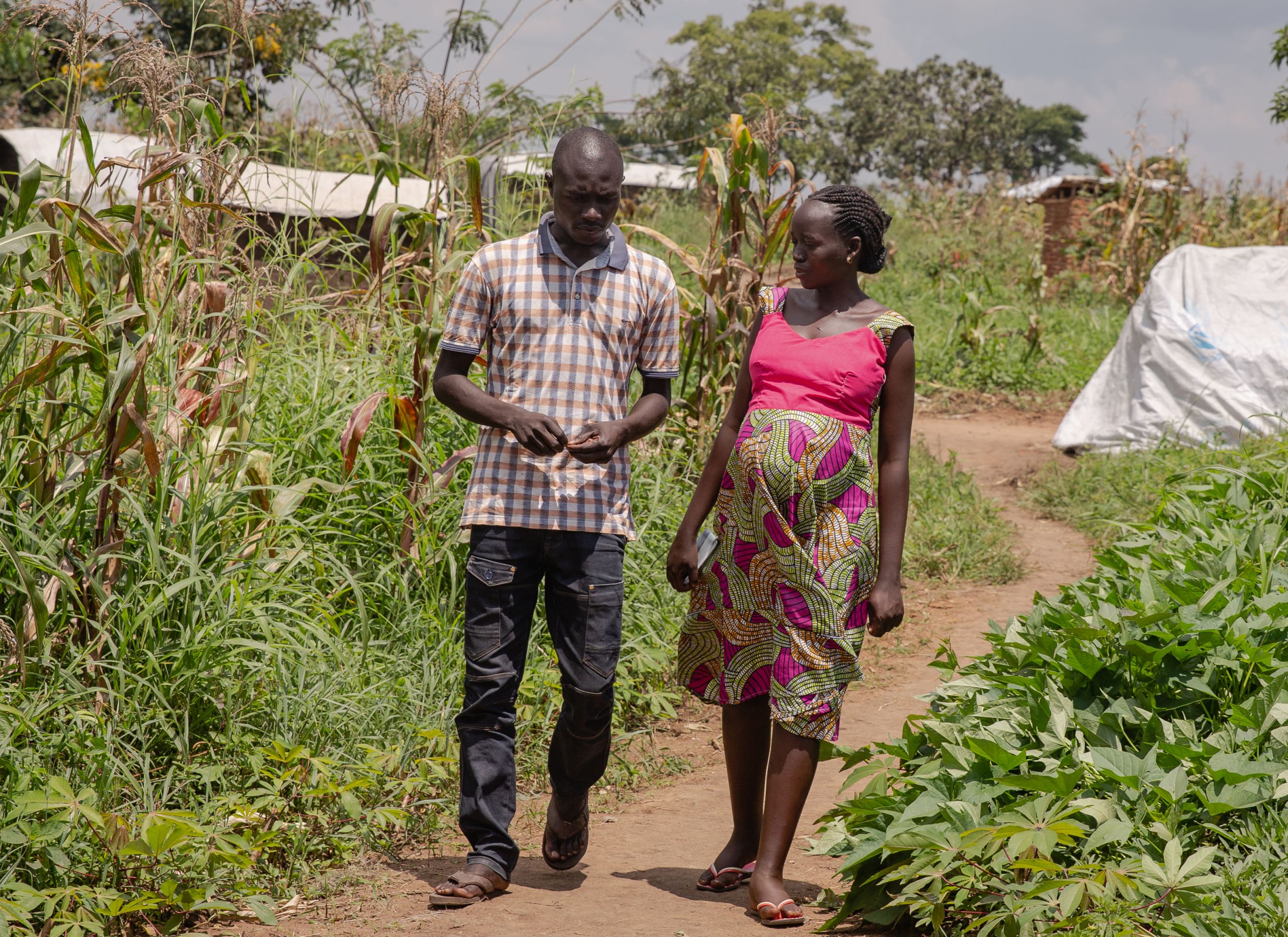
She met her husband in the refugee camp. They both dream of getting work so that they can support themselves and the child that they are expecting soon. NRC works to help Mariam access her rights as a refugee in the camp.
She met her husband in the refugee camp. They both dream of getting work so that they can support themselves and the child that they are expecting soon. NRC works to help Mariam access her rights as a refugee in the camp.
Desperately in need of help
In 2002, Grace, from DR Congo, was ten years old:
“I saw them kill my mum, dad, aunt and one of her children. Everyone in the village had been told that they were going to have shooting training. So when we heard gunshots, we thought it wasn’t dangerous. But the shooting became very intense. It turned out to be an attack.”
Today, Grace, now 27, lives with her 11-year-old son in Kyangwali. They came to Uganda a year ago. I sit with her in the garden.
Ugandan authorities run the refugee camp where NRC and other organisations work. The authorities believe they can best help the refugees by communicating with them directly and not through intermediaries. Grace has been chosen by the women in her neighbourhood to be the person who reports to camp management. The women come to her if they have something they need to say.
Here’s how Grace summarises the situation the refugees are in:
“Being a refugee means that you don’t have a good life. The main challenge is having a small and unvaried diet. Money is another problem. Getting a job is difficult when you only speak French – which we learned at school in DR Congo – and not English as they speak here. It is not always safe. Recently, five women went out to fetch wood, and three of them were raped."
She pauses, looks into my eyes and says with a sombre voice:
"Among them was a 14-year-old girl who is still severely traumatised."
The sky over Kyangwali is getting dark. Before we say goodbye, Grace says:
“Life is not easy. Still, we are glad we are allowed to stay here. After all, in Uganda, there is peace.”
